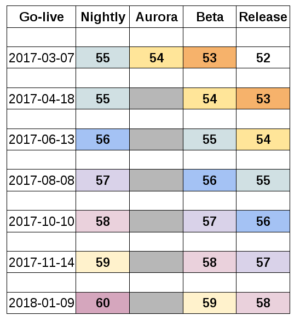
Firefox is killing off the Aurora release channel, which will improve the speed at which new features can be rolled out—hopefully by as much as six to eight weeks. As of April 18, there are now just three main stages for new Firefox features: Nightly (alpha), Beta (beta), and Release (stable).

For the majority of Firefox's history (2004 to 2011) it used a conventional release cycle, with major releases roughly every year or two. With the release of Firefox 5 in June 2011, the browser moved to a new rapid release cadence that closely mirrored Google's Chrome, which had been releasing new features and picking up users very quickly. Four release channels were created—Nightly, Aurora, Beta, and Release—with the Firefox code moving between each channel every six to eight weeks. Thus, a new stable version of the browser plopped out the end of the pipeline roughly every two months, rather than every year.
Aurora was meant to have about 10 times more users than Nightly and act as an early stabilisation channel. If any new features were found to be unstable, they'd usually be disabled before heading down the pike to Beta, where there's meant to be about 10 times more users than Aurora. The process is repeated in the Beta channel, with the larger userbase hopefully discovering any remaining instabilities before the build is handed over to the Release channel.
In practice, though, in the words of an unknown person at Mozilla, Aurora's "original intent never materialised." This is most likely because Aurora never attracted enough users to be useful—bleeding edgers went for Nightly, and the less-hardened developers and IT types went for Beta.
In addition, Mozilla deployed some modern processes over the last few years that mostly obviated Aurora's continued existence. For example, Mozilla now has a staged rollout mechanism for the Release channel, where new features—such as Electrolysis—are slowly rolled out to just a tiny fraction of Firefox's hundreds of millions of users. If the new feature causes a spike in crash rates, or telemetry data points to a previously undiscovered issue, Mozilla can halt the staged rollout and go back to the drawing board.
Users who are currently on the Aurora channel will be automatically moved to the Beta channel. Somewhat confusingly, though, those former Aurora users will join an (invisible?) "pre-Beta" stream inside the Beta channel, which will be the first to receive staged rollouts from the Nightly channel. Again, crash rates and telemetry will be used to determine whether features are ready to be ingested by a larger userbase.

The death of Aurora has a couple of other knock-on effects. First, the Aurora population on Android (Fennec) will be moved over to the Nightly channel. Second, those using the Developer Edition of desktop Firefox will be moved from Aurora to Beta. And localisation, which occurred in Aurora, will now move to Nightly; strings will still be frozen in Beta.
In recent news, Mozilla finally laid its Firefox OS efforts to rest, laying off 50 people in the process. On the desktop browser side of things, the most exciting development is probably multiple content processes, which should land in Firefox 54 (which hits the Beta channel today).
Listing image by Francois Grandin/AFP/Getty Images
reader comments
49